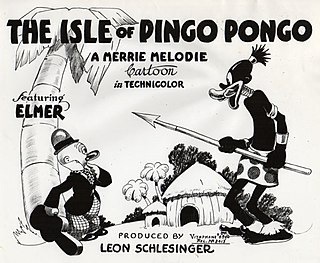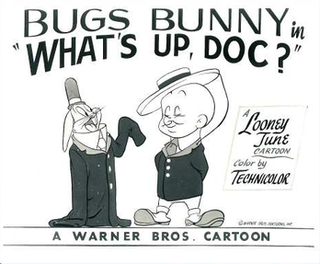Related Research Articles

Merrie Melodies is an American animated comedy short film series distributed by Warner Bros. Pictures. It was part of the Looney Tunes franchise and featured many of the same characters. It originally ran from August 2, 1931, to September 20, 1969, during the golden age of American animation, though it was revived in 1979, with new shorts sporadically released until June 13, 1997. Originally, Merrie Melodies placed emphasis on one-shot color films in comparison to the black-and-white Looney Tunes films. After Bugs Bunny became the breakout character of Merrie Melodies and Looney Tunes transitioned to color production in the early 1940s, the two series gradually lost their distinctions and shorts were assigned to each series randomly.

Hare Brush is a 1955 Warner Bros. Merrie Melodies animated short directed by Friz Freleng. The short was released on May 7, 1955, and stars Bugs Bunny and Elmer Fudd.

Hiawatha's Rabbit Hunt is a 1941 Merrie Melodies cartoon directed by Friz Freleng. Mel Blanc voiced all characters. This film was nominated for the Academy Award for Best Short Subject (cartoons), but lost to Walt Disney's Lend a Paw. This was the first Bugs Bunny cartoon directed by Friz Freleng. The short makes several direct references to The Song of Hiawatha, an epic poem by Henry Wadsworth Longfellow.

Elmer's Candid Camera is a 1940 Warner Bros. Merrie Melodies cartoon short directed by Chuck Jones. The short was released on March 2, 1940, and features Elmer Fudd and an early Bugs Bunny prototype.

The Isle of Pingo Pongo is a 1938 Merrie Melodies cartoon supervised by Tex Avery. The short was released on May 28, 1938, and features an early version of Elmer Fudd. This is the first of a series of travelogue spoofs, and the first Warner Bros. "spot gag" cartoon, where each vignette is punctuated by a moment of blackout.

What's Up, Doc? is a Looney Tunes cartoon directed by Robert McKimson and produced by Warner Bros. Cartoons. It was released by Warner Bros. Pictures on June 17, 1950 and stars Bugs Bunny and Elmer Fudd.

Slick Hare is a 1947 Merrie Melodies cartoon, directed by Friz Freleng. The film was released on November 1, 1947, and features Bugs Bunny and Elmer Fudd. It parodies the Mocambo nightclub in Los Angeles—in the cartoon referred to as "The Mocrumbo". Mel Blanc voices Bugs, Arthur Q. Bryan voices Elmer Fudd and impressionist Dave Barry portrays Humphrey Bogart. The title is a pun on "hair", from an era when hair slicked down by oil was a popular fashion style for men.

Little Red Walking Hood is a 1937 Merrie Melodies cartoon supervised by Fred Avery. The short was released on November 6, 1937, and features the first appearance of an early character who later became Elmer Fudd.

Person to Bunny is a 1960 Merrie Melodies animated cartoon directed by Friz Freleng. The short was released on April 1, 1960, and stars Bugs Bunny, Daffy Duck and Elmer Fudd. It is the last cartoon to feature Arthur Q. Bryan as the voice of Elmer, and was released shortly after Bryan's death.
Holiday for Shoestrings is a 1946 Warner Bros. Merrie Melodies cartoon short directed by Friz Freleng. The short was released on February 23, 1946. The film is a spoof of the fairy tale "The Elves and the Shoemaker".
What Makes Daffy Duck is a 1948 Warner Bros. Looney Tunes cartoon directed by Arthur Davis. The cartoon was released on February 14, 1948, and stars Daffy Duck and Elmer Fudd.

A Day at the Zoo is a 1939 Warner Bros. Merrie Melodies cartoon supervised by Tex Avery. The short was produced in 1938 and released on March 11, 1939 and features an early version of Elmer Fudd.
A Feud There Was is a 1938 Warner Bros. Merrie Melodies cartoon directed by Tex Avery. The short was released on September 24, 1938, and features the fourth appearance of an early version of Elmer Fudd.
Dog Gone People is a 1960 Warner Bros. Merrie Melodies cartoon animated short directed by Robert McKimson. The short was released on November 12, 1960 and features Elmer Fudd.

Elmer J. Fudd is an animated cartoon character in the Warner Bros. Looney Tunes/Merrie Melodies series and the archenemy of Bugs Bunny. His aim is to hunt Bugs, but he usually ends up seriously injuring himself and other antagonizing characters. He speaks in an unusual way, replacing his Rs and Ls with Ws, so he often refers to Bugs Bunny as a "scwewy" or "wascawwy (rascally) wabbit". Elmer's signature catchphrase is, "Shhh. Be vewy vewy quiet, I'm hunting wabbits", as well as his trademark laughter.
Good Night Elmer is a 1940 Warner Bros. Merrie Melodies cartoon short, directed by Chuck Jones, animated by Phil Monroe and written by Rich Hogan. The short was released on October 26, 1940, and features Elmer Fudd.

Heir-Conditioned is a Warner Bros. Looney Tunes theatrical cartoon short directed by Friz Freleng and written by Warren Foster. The short was released on November 26, 1955, and features Elmer Fudd and Sylvester.

Cinderella Meets Fella is a 1938 Warner Bros. Merrie Melodies directed by Tex Avery and written by Tedd Pierce, based on the fairy tale of Cinderella. The short was released on July 23, 1938, and features the third appearance of an early version of Elmer Fudd.
Wise Quackers is a 1949 Warner Bros. Looney Tunes cartoon directed by Friz Freleng. The film was released on January 1, 1949, and stars Daffy Duck and Elmer Fudd.
The Hardship of Miles Standish is a 1940 Merrie Melodies cartoon directed by Friz Freleng. The short was released on April 27, 1940, and features Elmer Fudd.
References
- ↑ Beck, Jerry; Friedwald, Will (1989). Looney Tunes and Merrie Melodies: A Complete Illustrated Guide to the Warner Bros. Cartoons. Henry Holt and Co. p. 78. ISBN 0-8050-0894-2.
- ↑ Lenburg, Jeff (1999). The Encyclopedia of Animated Cartoons. Checkmark Books. pp. 77–79. ISBN 0-8160-3831-7 . Retrieved June 6, 2020.